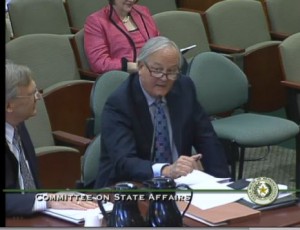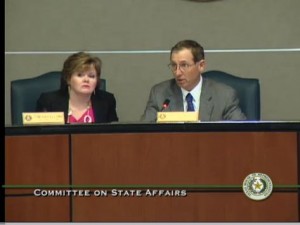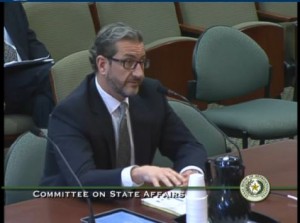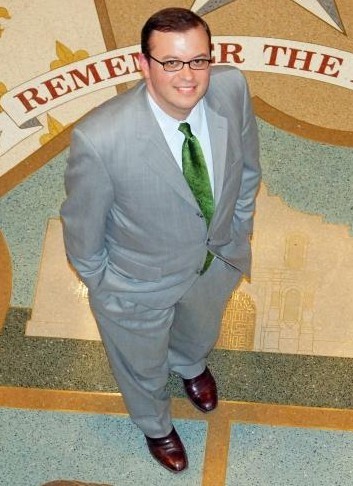This story originally appeared on The Quorum Report. Join us there for daily coverage of Texas politics and government.
By Scott Braddock and Harvey Kronberg
Senior state lawmakers from both parties made it clear this past week that Gov. Perry’s veto of a dark money bill last session and Sen. Ted Cruz’s criticism of their efforts now won’t deter a fresh push to rein in groups that are secretly spending big money to influence Texas elections. A long-planned State Affairs hearing on the issue was contentious at times on Thursday, including the ejection of one critic of more disclosure for violating the published rule prohibiting anyone but credentialed members of the Capitol press corps from recording the proceedings.
Rep. Charlie Geren, R-Ft Worth, set the tone for the hearing by pointing to a report claiming that “dark money” – cash of unknown origin concealed in tax protected 501(c)(4) organizations – is flooding politics. “The dark money is gonna way surpass $300 million,” Geren said of the current election cycle.
The debate took on a national flavor early in the day with Sen. Cruz arguing in a Facebook post that the bill passed by the Legislature last year but ultimately vetoed was “pernicious.” Cruz said if lawmakers pass another bill like it, “That would be a disastrous policy that would unconstitutionally chill free speech.”
Groups like Midland oilman Tim Dunn’s Empower Texans, Texas Right to Life, and others held a press conference prior to the hearing denouncing the proceedings as anti-free speech.
Testimony began with Texas Ethics Commission Chairman Jim Clancy, who stressed that under Texas law an organizations’ tax status has no bearing on whether that group is a political committee. Clancy said he supports raising the minimum contribution threshold for 501(c)(4) disclosure. The law is clear, but the process the commission now has to operate under is “cumbersome,” Clancy said, and added that the agency could benefit from greater clarity. He said lawmakers could consider clarifying sections of the definition of a political committee. He also suggested that enforcement is complicated by the fact that the commission must go to state district court to enforce subpoenas when investigating possible violations of Texas elections law.
It’s more like “the Texas transparency commission,” Clancy said. “We want it all to be disclosed. Texas has very few limits. It just requires disclosure.”
Perhaps the star witness, Utah State Rep. Jim Dunnigan, a Republican, told the panel about the investigation he led into dark money in his state. Dunnigan chaired an investigative committee that spent 8 months and $4 million to track down the influence secretly wielded by payday lenders in a Utah attorney general’s race.
In that race, Dunnigan said, payday lenders created a web of complex entities intended to conceal the source of the funds. The money was used pay for attack ads and push polls. One poll in particular gave the impression that a Hispanic candidate’s father may have been an illegal immigrant.
“They didn’t want the public to know that they were raising money from payday lenders,” he said. “If there’s nothing wrong with this hidden money then why was such an effort made to keep it so secret?” Dunnigan implied that concealing the messenger was important to the success of the message.
Rep. Jose Menendez, D-San Antonio, said the Utah statute enacted after the investigation headed up by Dunnigan was a potential model for lawmakers here. Several changes were made to Utah law, including a provision that says campaign consultants have special reporting requirements for expenditures, closing a big loophole. “If we don’t follow suit here in Texas, this is going to be a runaway train,” Menendez said.
Texans for Life Coalition President Kyleen Wright told the committee that while she and her board are “not immune to the concerns caused by releasing donors,” there should be a level playing field for groups that play in politics. Even the loudest critics of requiring more disclosure recognize that being able to look at donors is crucial when evaluating candidates for public office, Wright said. “That’s an important part of the story,” she said.
The hearing became particularly combative when Russell Withers with the Texas Conservative Coalition said that he was highly concerned about the “chilling effect” of the bill passed last year. In contrast to Dunnigan, Withers argued that people who see a political ad make their judgments based on the content of the advertising without regard to who funded the message. “As underhanded as those ads might be, those are time honored political strategies,” Withers said.
As others have done, Withers pointed to the landmark Supreme Court decision in NAACP v Alabama, which held that the group’s members could be kept secret. He said stronger disclosure laws would amount to the government arbitrarily deciding at what threshold people have to disclose participation in politics.
Rep. René Oliveira, D-Brownsville, took exception to the comparison and pointed out that in 1958, African-Americans in Alabama were threatened with church bombings, cross burnings, and more. Nothing like that is happening now, Oliveira said.
The powerful chairman of the committee, Rep. Byron Cook, R-Corsicana, was similarly unimpressed with Withers’ arguments and asked him if he was even listening when the state representative from Utah was telling the panel about what had unfolded there.
“I am just struggling with the logic,” Cook said of the argument that it does not matter who funded a political advertisement. “You’re telling this committee that you think that’s fair? I think hoodwinking the public that way is pretty reprehensible,” Cook said. Cook pointed to the lesser-known portion of the Citizens United Supreme Court ruling that said while contributions by corporations can now be unlimited, disclosure of those donations can be required.

Attorney and lobbyist Steve Bresnen has battled Empower Texans in court and at the Ethics Commission for two years.
Steve Bresnen, the attorney and lobbyist who has battled Empower Texans for two years, said he came before the panel to speak in plain language. “We are not discussing voter fraud today,” Bresnen said. “We are talking about creating entities for the express purpose of committing fraud on the voters.”
Bresnen said there are sophisticated operators going to great lengths to keep Texas voters from knowing who is funding political messages. He pointed out that the Texas Government Code already requires the Ethics Commission to do all it can to “disclose fully information related to expenditures and contributions for elections and for petitioning the government.” That’s about as unsophisticated and uncomplicated a sentence as one will find in Texas law, Bresnen said.
The Ethics Commission is doing the best it can to promote transparency in elections but the agency is dealing with some “problematic” statutes regarding enforcement, Bresnen said. Pointing to the fact that there are groups of all political stripes that disclose their donors, Bresnen said “This is no witch hunt against conservatives,” as some have alleged.
Rather than wait for another legislative session and another election cycle before disclosure would be required, he called on the committee to urge the commission to use its rule-making power to compel disclosure of political money concealed in 501(c)(4) groups.
“Texas can’t defend herself,” Bresnen said. He told the committee: “Only you can defend Texas.”
You can watch the entire State Affairs hearing here.
Copyright May 01, 2014, Harvey Kronberg, www.quorumreport.com, All rights are reserved. Reprinted with permission.



